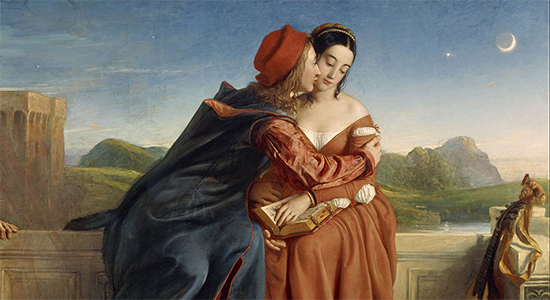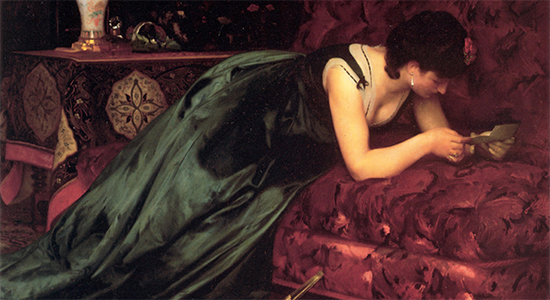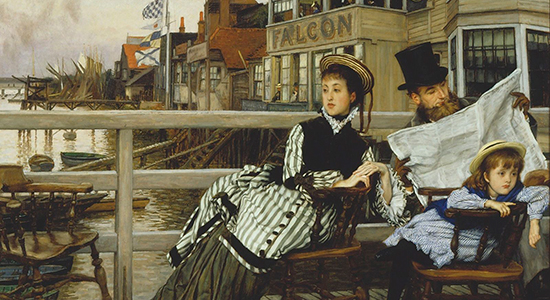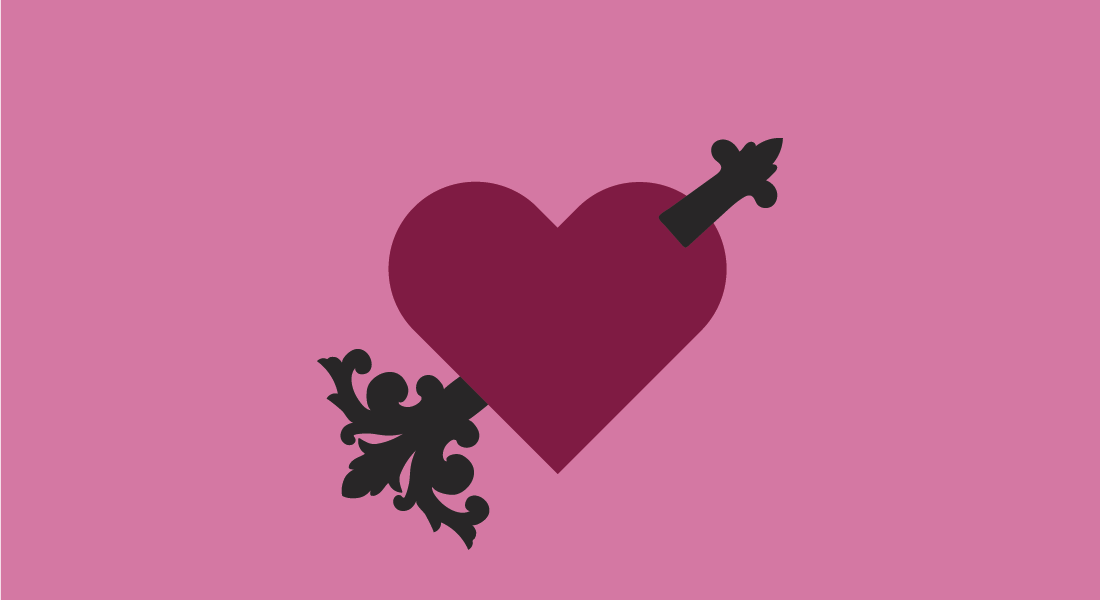Where Love Happens: Topographies of Emotions in Nineteenth-Century European Literature
The project aims to demonstrate how the historicised paradigm of romantic love was affected by spaces and places. Combining the fields of philosophy, affect theory, literary criticism, and print culture, it bridges literature with the history of emotions, as it explores the transformative powers of love in nineteenth-century European culture.
A series of recent publications argue that love is changing. Indeed, so many different conceptions of Romantic love circulate in the academic discourse that nobody seems to speak of the same thing. This leads us to the following questions:
- If a genuine and consistent conception of love does exist in Romanticism, how can it be defined?
- What is paradigmatic about the idea of Romantic love and if so, how did it come about?
- Has the “background picture of love” really lasted without major changes since the nineteenth century, or is there a more complex history of love to be written?
- How did places and spaces – space on printed pages, topoi in popular literature, touristic literarysites – affect the canonisation of Romantic love in the nineteenth century?
We address these questions in four individual, yet closely interlocking, parts: Philosophies of Love, Pages of Love, Sites of Love, and Languages of Love.
- Philosophies of Love - Animal Amans: Günther Anders’s Philosophy of Love
Alexander Knopf (AK)
In the project’s first phase, AK will provide an account of the emergence of the theory of Romantic love in German, English, and French philosophy and literature. In the second part, he will reconstruct the philosophy of love developed by Günther Anders (1902-1992). By combining Anders’s observations from his seminal book Lieben gestern. Notizen zur Geschichte des Fühlens and the fragments of the history of feeling scattered throughout his posthumous papers, AK aims to give a more complete account of it than Anders himself achieved in his own lifetime.
- Rights of love: ‘when love speaks’, articulating equality and declaring love’s right
Helene Grøn (HG)
HG’s project looks at the connection between love and human rights from the 19th Century, drawing parallels to today. Tied together by their claim to universality, love and human rights can be understood to rely on articulation and equality for an outward life, but also on continual revision. Love’s Right holds three lines of inquiry: firstly, to explore love as a condition for creating equality. Secondly, interrogating how a prism for ‘reading rights’ might be developed in holding declarations of love and rights together. Thirdly, to unfold spatiotemporal connections of rights-discourse between the works of 19th and today as new ways of enacting love and rights are emerging.
- Sites of Love - Where Love Took Place: Literary Tourism in the Nineteenth Century
Lene Østermark-Johansen
This project deals with the emergence of a literary tourism in Europe, based on locations for famous love stories, drawing readers abroad, alone, à deux, or in groups, in pursuit of literary love. It examines the ways in which reading of love begets travel in a merging of fiction and reality. The project revolves around the effect and affect of literature, how it moves us, emotionally and physically, making us leave home in search of sites where characters in poetry and fiction experienced love. The project spans many aspects of culture: high and low, visual and print culture, as it seeks to map the dynamic and creative topography of a European literature of love. -
Languages of Love – New Technologies as Languages of Romantic Experience in Nineteenth-Century European Culture
Joanna Beaufoy (JB)
JB’s project wonders whether emotions of loving were staged, sparked or sustained by material conditions —both designed and accidental— made possible through lighting technologies. The revolutions that gas and electric lighting brought to how we lived, felt, and loved gave writers and designers new tools to structure and inspire romance. What were the functions of lighting in writing about emotions at the time? Did they change with technology? How does noticing what was lit up, and what was kept in shadow, help us to define Romanticism’s conception of love?
Alexander Knopf
- Die Erfindung der Liebe in der deutschen Romantik
Helene Grøn
- Staging Love, adaptations of Shakespeare
- Writing in English: Creative Writing Workshop
- Writing in English: Creative Non-fiction in English
- The Contemporary Novel
- English - Literature, History and Culture (Open University)
Lene Østermark-Johansen
- Romantic love on the stage and on the page from the Renaissance to the 1930s
- The delights and dangers of reading about love in the nineteenth century
Joanna Beaufoy
- French art, literature, philosophy, politics between 1789 and 1945
The entire research group
June 2021: Kick-off conference at Hornbækhus
October 2021: Visit and guest lecture by Professor Dr. Gesa Stedman, Grossbritannienzentrum, Humboldt Universität Berlin, who spoke on ’The Injurious Fruits of Ungoverned Passion: Narrating the Emotions in Nineteenth-Century Literature’.
November 2021: Visit to the Goethe Haus and Romantik Museum in Frankfurt and meeting with the museum Director Professor Dr. Anne Bohnenkamp and chief Curator Dr. Wolfgang Bunzel about a future exhibition on romantic women in love.
September 2022: Visit from Professor Cian Duffy, English Department, University of Lund about digital exhibitions and future collaborations
October 2022: Visit to Paris (Musée Carnavalet, Père Lachaise, Lighting Museum Lumière de l’oeil, Musée Cognacq Jay, Musée de la Vie Romantique)
Alexander Knopf
28 February 2021: ‘Scandal and Scansion: The Invention of Romantic Love’. Talk given at the Global Histories Forum, Engerom
2 November 2021: ‘The Romantic Woman – Women in Romanticism’. Design of an exhibition concept which was presented at the Museum for Romanticism/Freies Deutsches Hochstift, Frankfurt
5 November 2021: Archive visit at the Adolf Würth Zentrum for the History of Psychology, Würzburg (Germany)
30 June/1 July 2022: Talk at the workshop “Friedrich von Hardenberg (Novalis) und Friedrich Schlegel im Gespräch mit Briefkorrespondentinnen” [“Friedrich von Hardenberg (Novalis) and Friedrich Schlegel in conversation with female correspondents”], Deutsches Romantik-Museum, Frankfurt/Main. Title of the talk: “Am Rande des Gesprächs. Stiluntersuchungen der epistolaren Kommunikation im Schlegel-Kreis (Friedrich Schlegel, Caroline Schlegel, Novalis, Dorothea Veit)” [At the edge of the dialogue: A stylistic examination of the epistolary communication within the circle of the Schlegels]
Helene Grøn
Conference papers at:
- International Federation of Theatre Research, Annual Conference, 2022
- Making a Scene - performative gestures of noise, interference and destruction, Symposium held by Theatre and Performance Studies, Department of Arts and Cultural Studies, University of Copenhagen, 2022
Lene Østermark-Johansen
June 2021: ‘Topography in Goethe’s Werther: At Home and Abroad’, kick-off conference ‘Where Love Happens’, Hornbækhus
August 2021: participation in 5-minute brief film on falling in love, organized by the Royal Danish Academy of Letters and Sciences and TV2
September 2021: ‘“Galeotto fu il libro”: Depicting Paolo and Francesca and the dangers of reading in nineteenth-century art.’, at the conference ‘Intarsi Danteschi: “Vita Nuova” e “Comedia” nella cultura anglo-americana dell’ottocento a Firenze.
November 2021: ’The Love that Dare not Speak its Name: Oscar Wilde i Danmark’, Hertoft-eftermiddage, Sexologisk Forskningscenter
February 2022: presentation of the exhibition proposal ’Les choses de l’amour’: Europeans in Love 1750 - 1850’ at a Zoom-conference with the Romantik Museum Frankfurt
July 2022: ’Connecting the liberty of the heart with the free play of human intelligence: Abelard and Heloïse and the Spirit of the Renaissance’, International Walter Pater Society Conference in Venice
Joanna Beaufoy
October 2021: Helped to prepare visit to Deutsches Romantik Museum in Frankfurt
November 2021: Visited Paris city archives
December-January 2021: Co-created exhibition concept with the research group
February 2022: Presented the group’s exhibition concept to the Deutsches Romantik Museum in Frankfurt
March 2022: Visited the Museum of Lighting in Liège, Belgium
April 2022: Presented a paper “Comme le jour et la nuit ? Reimagining Parisian night and day in light of gas and electricity” at the Society of Dix-Neuviémistes conference in Belfast
October 2022: Submitted article for the Dix-Neuf journal based on the above talk
- 24 March 2023 Love and Light Symposium Department of English, Germanic and Romance Studies, University of Copenhagen
- June/July 2023 ‘The Plasticity of Emotions: Günther Anders’s contribution to the history of feelings’ conference, Copenhagen, International Günther Anders Gesellschaft
- Autumn 2023 ‘Dissecting Love: Love and…’ symposium in Copenhagen
- Autumn 2023 Workshop on literary tourism with the Writing 1900 group in Copenhagen
- spring 2025 Exhibition at the German Romanticism Museum, Frankfurt: ’The Romantic woman – women in Romanticism’
Alexander Knopf
- Günther Anders, Die Totenpost, hg. und kommentiert und mit einem Nachwort von Alexander Knopf (Göttingen: Wallstein Verlag, 2022).
Helene Grøn
- ‘To live well is to story well’: Love, rights and polyphonic writing with Denmark’s asylum community. Book Chapter in Contemporary Representations of Forced Migration in Europe (Palgrave Studies in Literature, Culture and Human Rights), Forthcoming 2023.
- Asylum and Belonging through Collective Playwriting: ‘How Much Home Does a Person Need?’, Monograph for Palgrave Macmillan, Forthcoming 2023.
- I am Queen Mary: On Sustained Protest. Performance Research Journal. Vol. 27, No. 1: ‘On Protest’, Forthcoming 2023
- ‘Not just theatre, also politics, law’: Resisting the Refugee Narrative. On the migratory aesthetics and dramaturgical ethics of writing a play with a group from Deportation Centre Sjælsmark. Research in Drama Education: The Journal of Applied Theatre and Performance. DOI: 10.1080/13569783.2022.2057793, 2022.
Lene Østermark-Johansen
- Walter Pater’s European Imagination (Oxford: Oxford University Press, 2022).
- ‘“Galeotto fu il libro”: Depicting Paolo and Francesca and the dangers of reading in nineteenth-century art’ in Serena Cenni (ed.), Intarsi Danteschi: ‘Vita Nuova’ e ‘Comedia’ nella cultura anglo-americana dell’Ottocento a Firenze (Florence, 2022 – forthcoming).
Researchers
| Name | Title | Phone | |
|---|---|---|---|
| Beaufoy, Joanna | PhD Fellow | ||
| Grøn, Helene | Postdoc | ||
| Knopf, Alexander | Assistant Professor | +4535332577 | |
| Østermark-Johansen, Lene | Professor | +4535328583 |
Funding

Project period: 1 May 2021 - 30 April 2025
PI: Professor Lene Østermark-Johansen
Events
Dissecting Love
Introducing our research
Lene Østermark-Johansen (audio file)
Transcription
Alexander Knopf (audio file)
Transcription
Joanna Beaufoy (audio file)
Transcription




